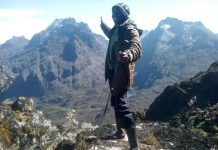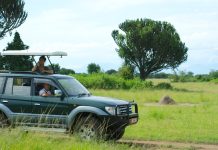Uganda has announced an increase in permit fees for primate trekking experiences from July 1st 2024.
Effective from when the announcement was made, the gorilla permit fees have been increased for all bookings from July 1st 2024 to July 2026 to US$800. This adjustment marks a significant shift in the cost of experiencing one of nature’s most captivating wonders: the majestic mountain gorillas of Uganda that live in Bwindi Impenetrable National Park and Mgahinga Gorilla National Park.
UWA has increased tracking fees for mountain gorillas from US$700 to US$800 for international travelers and for chimpanzees from US$200 to US$250.
The Uganda Wildlife Authority has also introduced a discounted fee of US$500 for all African passport holders.
Gorilla habituation permits have remained the same at US$1500 for all those looking to a longer stay of up to four hours with the mountain gorillas in the southern sector of Bwindi Impenetrable National Park.
On the other hand, the chimpanzee permits for Kibale National Park have been increased from US$200 to US$250 while for permits for Kyambura Gorge and Kalinzu Forest in Queen Elizabeth National Park have been double from US$50 to US$100.
It should be noted that while the increase in fees applies to international tourists while charges for local tourists remain unchanged.
It has also been confirmed that bookings that were made at the old rates of US$700 will be honored for all trips that were confirmed before the announcement.
Uganda is one of the few destinations where gorilla trekking can be experienced. The meetup with the mountain gorillas are only done in three countries in the world; Uganda, Rwanda and the Democratic Republic of Congo (DRC).
The Uganda Wildlife Authority’s decision to increase the price of gorilla tracking permits from $700 to $800 has stirred excitement and concern among wildlife enthusiasts and conservationists alike.
According to Mr. Sam Mwandha, the executive director of UWA, the decision to raise these fees, stems from a comprehensive review of the conservation tariff. The decision aims at controlling the number of tourists who go gorilla trekking in Uganda and also aimed at raising the much needed fees for gorilla conservation.
In a letter dated January 17th 2024, The Uganda Wildlife Authority has notified the tour operators and the public that the increase in gorilla permit fees have been forced by a new conservation tariff.
Indeed, the increase in gorilla permit fees promises to inject much-needed resources into initiatives aimed at safeguarding the gorillas and their natural habitats. A portion of the proceeds from permit sales is earmarked for community development projects, ranging from the construction of schools and hospitals to the establishment of income-generating ventures. Uganda endeavors to strike a delicate balance between economic growth and environmental preservation by fostering sustainable partnerships between wildlife conservation and local livelihoods.
Yet, amidst discussions of rising costs and conservation dividends, one cannot overlook the broader context of gorilla tourism in the region. Despite the incremental price hike, Uganda remains a beacon of affordability compared to neighboring Rwanda, where tracking permits command a staggering $1500 for all those looking to gorilla tracking in Volcanoes National Park. This favorable pricing differential positions Uganda as an attractive destination for travelers seeking an immersive gorilla experience without breaking the bank.
The recent announcement also revealed that five additional gorilla families have been habituated in Bwindi Impenetrable Forest. The development further enhances Uganda’s appeal as a premier gorilla tracking destination. With over 24 habituated groups now available for trekking, the total allocation of 192 permits per day ensures greater accessibility and flexibility for tourists, even during peak seasons. This expansion not only diversifies the visitor experience but also augments the chances of encountering these remarkable primates in their natural habitat.
In light of these developments, prospective travelers are urged to seize the opportunity presented by the current pricing window and secure their gorilla permits before the impending change. By doing so, they not only stand to realize substantial savings but also contribute to the ongoing conservation efforts that underpin Uganda’s thriving wildlife tourism sector.
In essence, the increase in gorilla tracking permit fees represents a pivotal moment in the trajectory of Uganda’s conservation journey. As the country navigates the delicate balance between economic imperatives and environmental stewardship, the enduring allure of its iconic mountain gorillas serves as a poignant reminder of the priceless value of preserving our planet’s natural treasures for generations to come.





